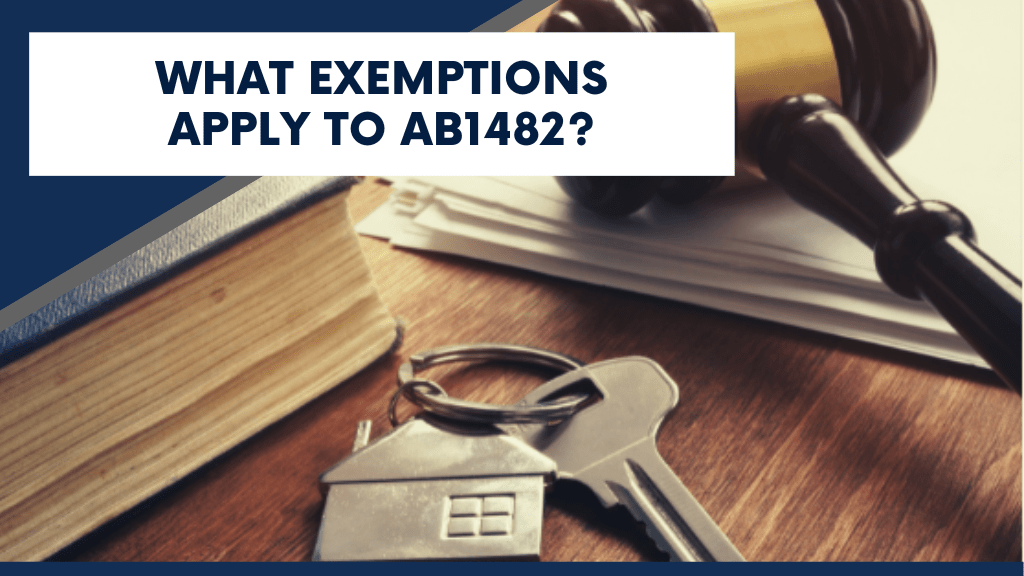The Tenant Protection Act, AB1482, is a California law that went into effect on January 1, 2020, just months before the COVID-19 pandemic triggered eviction moratoriums throughout the state and the country.
Now that the moratorium has been lifted (outside of LA County) and rental values continue to go up, what does the statewide rent control law mean for you and your investment properties?
It means that if your property is covered by this law, you cannot raise the rent more than what is mandated by the state. It caps the amount of rent increases on most properties that are impacted to no more than 5 percent plus Consumer Price Index (CPI) on an annual basis. If CPI exceeds 5 percent, the cap is a maximum of 10 percent gross.
But, does your property qualify for this rent control law, or are you exempt?
We’re taking a look at exemptions today, and helping owners understand how to comply with AB1482, even if they do have a property that’s exempt.
Overview of AB1482 Exemptions
According to the law, rent control restrictions would not apply to the following properties:
- Units and homes constructed in the last 15 years. This exemption is on a rolling basis, so if your property was built in 2010, it would be exempt from rent control in 2022, but subject to rent control later, in 2025.
- Your property is exempt if it is restricted to be affordable for low- or moderate-income residents.
- Single-family rental homes are exempt unless they are owned by a real estate investment trust (REIT), a corporation, or an LLC where one of the members is a corporation. The exemption for single-family residences does not apply if there is more than one dwelling on the same lot, or if there is an additional dwelling unit in the building that cannot be sold separately (think about a garage apartment or an attached in-law unit).
- Duplexes and other two-unit properties are exempt unless one unit is occupied by the owner.
- Most dormitories are exempt.
These exemptions have their own nuances. Most of the property owners we work with in Los Angeles and the surrounding areas aren’t renting out dormitories, so the exemptions we want to focus on are those that apply to your newly built properties or your single-family homes.
Age Exemptions to AB1482
The major exemption depends on when your certificate of occupancy was issued.
If you’re renting out property that has been issued a certificate of occupancy within the previous 15 years, that rental home is exempt from the statewide rent control law. Before AB1482 went into effect, we were working strictly within the parameters of local rent control laws and the Costa-Hawkins Act, which has been the law in California since 1995. This act prevents the institution of rent control in single-family residences and condos but also prohibits the institution of rent control on properties built after 1995.
Here’s an example of how you measure whether your property is bound to Costa-Hawkins or AB1482:
Maybe you have a five-unit apartment building that was built in 1996. That means it would fall under Costa-Hawkins and not be subject to rent control. BUT, AB1482 changes that because of the language in the law that references housing that has been issued a certificate of occupancy within the previous 15 years.
Unlike Costa-Hawkins, AB1482 does not set a definite date after which you are exempt. Costa-Hawkins says December 31, 1995, and everything after that is exempt. However, your rental property will be subject to rent control once the certificate of occupancy is more than 15 years old.
So, the important question for you when determining whether your property is subject to or exempt from AB1482 is this: How old is your property?
Exemptions for Single-Family Homes
If you’re renting out a single-family home in Los Angeles County, you’re likely exempt from AB1482 rent control restrictions. But, if you have the rental home in an LLC and one of the partners in that LLC is a corporation or a REIT, you may still be subject to the rent control laws.
There may also be some confusion around condos. Are they exempt?
This exemption applies to single-family homes and condominiums. If you can sell one part of the unit without having to sell the other parts of the unit, you qualify for the exemption. If you have a duplex, you can’t sell one half of the duplex. However, with a condo, you own one specific space even if it’s in a community of other condos. This is why a condominium is considered alienable separate and a duplex is not.
As we have mentioned, to apply the single-family exemption, the owner of the property cannot be a real estate investment trust (REIT) or a corporation or a limited liability company (LLC) in which at least one member is a corporation.
Lease Language for AB1482 Exemptions
Your lease agreement needs to reflect whether or not your property is subject to or exempt from the rent control laws.
For the single-family home exemption, you’ll want your lease to include language such as:
“This property is not subject to the rent limits imposed by Section 1947.12 of the Civil Code and is not subject to the just cause requirements of Section 1946.2 of the Civil Code. This property meets the requirements of Sections 1947.12 (d)(5) and 1946.2 (e)(8) of the Civil Code and the owner is not any of the following: (1) a real estate investment trust, as defined by Section 856 of the Internal Revenue Code; (2) a corporation; or (3) a limited liability company in which at least one member is a corporation.”
To protect your rent control exemption, that statement must be included in any tenancy initiated or renewed on or after July 1, 2020. For tenancies existing prior to July 1, 2020, a written addendum must be added.
 When it comes to establishing an exemption because of the age of your property, you’ll need to mention in your lease that the law does not apply to your rental unit until a specific date when the 15-year exemption expires. Once that expiration date is imminent, you’ll need to include non-exempt verbiage in your lease agreement, notifying tenants that there are limits to the amount their rent can be increased.
When it comes to establishing an exemption because of the age of your property, you’ll need to mention in your lease that the law does not apply to your rental unit until a specific date when the 15-year exemption expires. Once that expiration date is imminent, you’ll need to include non-exempt verbiage in your lease agreement, notifying tenants that there are limits to the amount their rent can be increased.
If you’d like some help navigating the legal exemptions of AB1482, we’re here to help. Please contact us at Bell Properties for all of your LA County property management needs.


